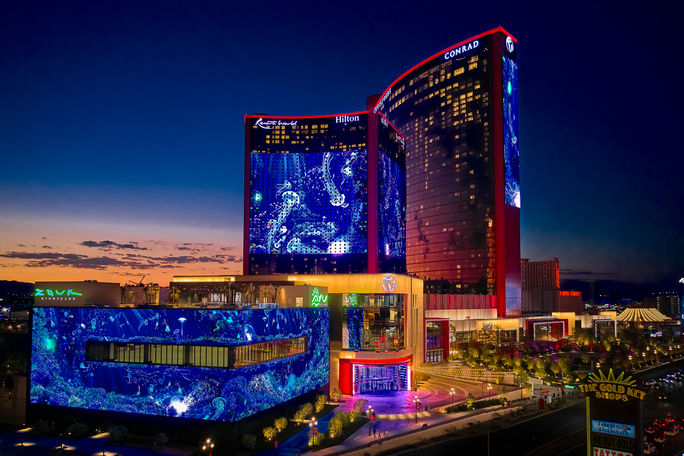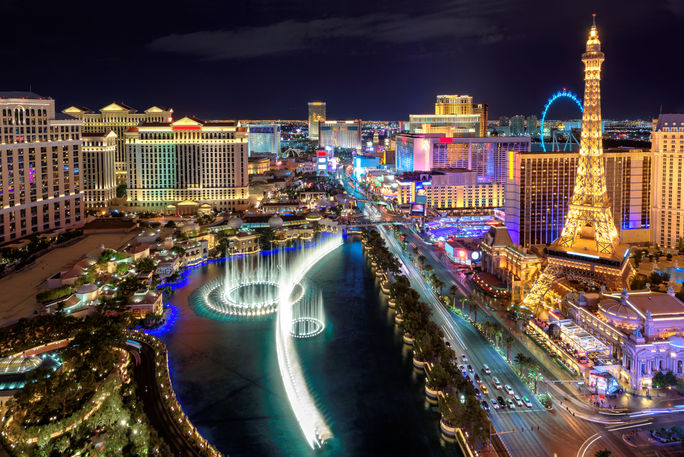Written by Mia Taylor, TravelPulse by Northstar, June 10, 2025

Since at least the early 1900s, Las Vegas has been known as Sin City, a place meant to be an adult playground where anything goes.
Historically, that playground included a heavy dose of gambling and alcohol, along with all manner of nightlife.
But the city, which began as a dusty outpost in the Mojave Desert, celebrated its 120th anniversary in mid-May and the passage of time has brought many changes. Some say Las Vegas has moved beyond its “What happens here, stays here” reputation to become a destination featuring a diverse range of experiences.
The new incarnation of Las Vegas, say keen observers, has become a hub for luxury, wellness and cultural experiences. It’s also a destination that’s consistently showcasing the hottest musicians on the planet and over the past few years, Las Vegas has officially staked its claim as a sports mecca, as well.
In other words, the Las Vegas of decades past, is in some ways becoming just that, a part of the past.
by Mia Taylor
Last updated: 7:00 AM ET, Tue June 10, 2025
Since at least the early 1900s, Las Vegas has been known as Sin City, a place meant to be an adult playground where anything goes.
Historically, that playground included a heavy dose of gambling and alcohol, along with all manner of nightlife.
But the city, which began as a dusty outpost in the Mojave Desert, celebrated its 120th anniversary in mid-May and the passage of time has brought many changes. Some say Las Vegas has moved beyond its “What happens here, stays here” reputation to become a destination featuring a diverse range of experiences.
The new incarnation of Las Vegas, say keen observers, has become a hub for luxury, wellness and cultural experiences. It’s also a destination that’s consistently showcasing the hottest musicians on the planet and over the past few years, Las Vegas has officially staked its claim as a sports mecca, as well.
In other words, the Las Vegas of decades past, is in some ways becoming just that, a part of the past.
about:blank

Las Vegas 2.0
When Ronn Nicolli arrived in Las Vegas 25 years ago from Ohio, the city was a vastly different place.
“It was 90 percent casino, they threw in some buffets and there would be some Vegas shows,” recalls Nicolli, who began his career in the city distributing flyers to tourists on the street.
Over the past two-decades-plus, Nicolli has worked his way up from that entry level position walking the city’s streets to CMO of the $4.3 billion Resorts World Las Vegas, a resort and casino on The Strip that includes three hotels: Las Vegas Hilton at Resorts World, Conrad Las Vegas at Resorts World, and Crockfords Las Vegas.
The Las Vegas Nicolli found when he first arrived decades was a place where entertainers came to end their careers. (Think Sammy Davis Jr., The Osmonds, Johnny Mathis and the like.)
The current version of Las Vegas however – the one the city has been busy evolving into – couldn’t be further from that era. Among the city’s most noticeable recent developments is the non-stop stream of top musical talent arriving to perform. Over the past few years musical residencies have included Bruno Mars, Maroon 5 and even U2 and Lady Gaga.
“Now we look at it and some of the biggest entertainers in the world, who are at the peaks of their careers, are coming to Vegas and having Vegas residencies, which is very different,” says Nicolli. “Twenty years ago it was ‘Hey, you’re at the tail end of your career, let’s give you a Vegas show.’ Now, the greatest entertainment in the world is coming. That’s a very different feeling than what we experienced in the past.”
At the same time it’s been morphing into a first-class music destination, Las Vegas has also been busy attracting one major sporting event after another, not to mention sports franchises. It’s another significant development that Nicolli says has contributed to the city’s metamorphosis.
“Twenty years ago, if we were sitting here talking about the sports dynamic of Las Vegas, we’d talk about boxing, we’d probably talk about UNLV basketball – because it had a very prevalent run, but we didn’t have a football team, we didn’t have a hockey team and we didn’t have a baseball team coming,” continues Nicolli. “And if the rumors hold true, we’ll hopefully have an NBA team also.”
Nicolli is of course referring to the fact that Las Vegas is now home to the National Football League’s Raiders, along with the National Hockey League’s Golden Knights. And more recently, there’s been rumblings that Las Vegas could get its own NBA franchise to complete the sports trifecta. The icing on the cake for sports fans is the city’s flourishing Formula 1 racing activity.
“When you look at it, we’re a sports metropolis,” suggests Nicolli.
The city’s burgeoning sports industry is also the driving force behind yet another recent and notable development among Las Vegas’ offerings: An exploding health industry.
“We now have real athletes living in Vegas or coming to Vegas to train and using it as an off-season home,” says Nicolli. “That’s opened up a whole wellness sector in the city.”
It is perhaps the ultimate irony for a city that became legendary for excess and sin. Las Vegas resorts these days are far less focused on the cheap buffets and have instead invested heavily in extensive spa and fitness facilities to adapt to consumer preferences. Some industry watchers suggest this emerging development is likely to encompass medical tourism in Las Vegas in the future.
Las Vegas becomes a city for ‘sophisticated play’
Nicolli isn’t the only industry observer who has witnessed the changes unfolding in Las Vegas.
John Schadler, Executive Director for MONOGRAM, a marketing agency that works with luxury lifestyle companies throughout the United States, says Las Vegas has transformed “into a global epicenter for luxury hospitality, fine dining, high-end shopping, world-class entertainment, and professional sports.”
“This rapid transformation over several decades is truly unprecedented,” adds Schadler. “Today, the city boasts the largest concentration of celebrity chef restaurants, luxury retail venues, and top-tier entertainment found anywhere.”
Now, Las Vegas is a place where adults can engage in “sophisticated play,” says Schadler, who suggests the city’s modern evolution was set in motion, in some ways, by the 1989 opening of The Mirage.
The Polynesian-themed Mirage was the most expensive hotel-casino ever built at that time, costing a staggering $630 million. It boasted a 54-foot volcano that erupted nightly, lush tropical gardens, waterfalls, and lagoons and a variety of entertainment, all under one roof. The innovative property was something of a precursor to the over-the-top mega resorts that would follow, each featuring unique decor and entertainment offerings that are now a Vegas calling card.
The Mirage’s “immediate success led to a wave of massive resort developments and proved that experience-focused integrated resorts could be wildly profitable,” says Schadler, who was on the executive team that launched The Mirage. “The city has never looked back, continually reinventing itself.”
That reinvention grew to include a subtle shift away from gaming over the , says David G. Schwartz. a Las Vegas Strip, gaming, and tourism historian and professor at University of Nevada, Las Vegas.
This development was accelerated by an increased focus on events outside of Las Vegas’ traditional tourist corridor, The Strip. And after the world emerged from the COVID-19 pandemic, the shift from a gaming-focused destination to a more broadly-based hospitality and tourism destination continued.
“The advent of major league pro sports–the Raiders, Aces, and Golden Knights–has done a great deal to put Las Vegas on the map, as has hosting events like the Superbowl and Wrestlemania,” says Schwartz.
“There is an increased emphasis on non-gaming and even attractions off the Strip,” adds Schwartz. “Back in 1990, no trip to Las Vegas would have been considered complete without gambling. Now, someone can not gamble and still say they have seen everything the city has to offer.”

The continued allure of a sinful city
So, is Las Vegas’ gambling heyday becoming a thing of the past as it rapidly transforms to meet the needs of modern travelers? Not exactly.
It is the casinos, after all, that “keep the lights on,” in Las Vegas, says Nicolli, adding: “As much as there are additional attractions, there’s still a high percentage of customers coming out to gamble.”
Indeed, the desert city whose history and roots are synonymous with gambling and vice, is not likely to ever truly shake that persona. There will always be visitors who arrive in search of that image and that action.
And Nicolli says the city remains ready to oblige.
“I still think Vegas is the funnest place in the world and I think when people come here, even if they’re trying not to drink, I think they probably still partake,” says Nicolli. “I think people are still coming out here to spend disposable income, have a great time and live a little outside of their comfort zone in a safe way. And to create memories.”
